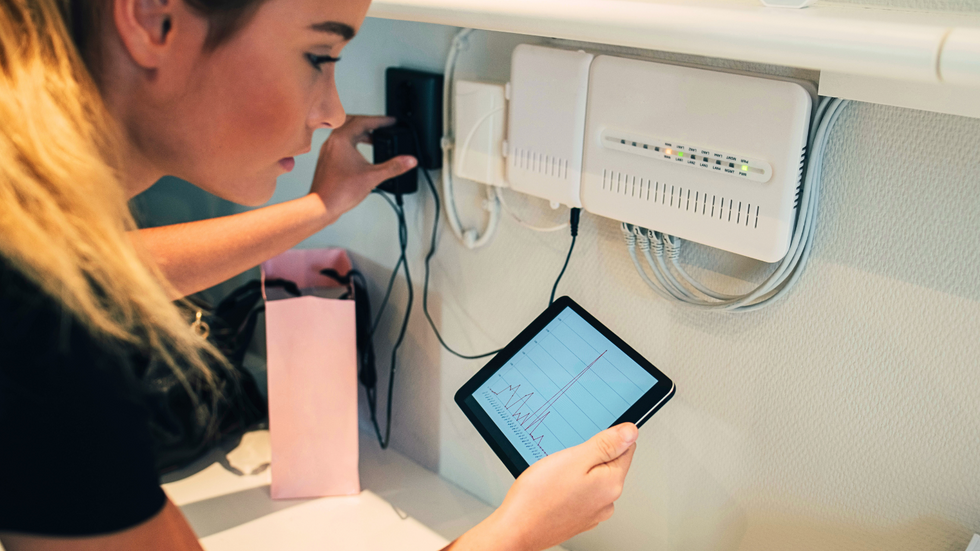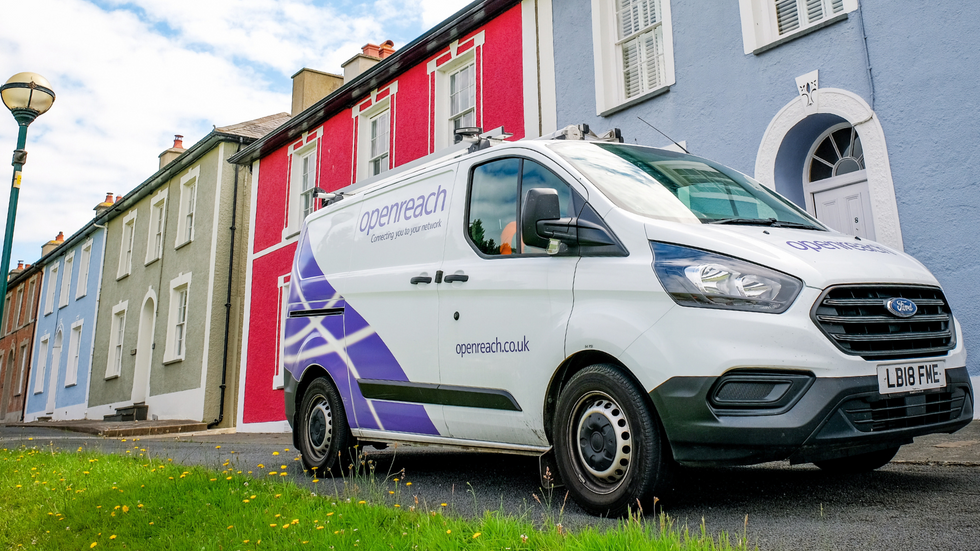
Openreach has confirmed the next 500 locations that will enjoy an upgrade to full-fibre connection speeds
OPENREACH PRESS OFFICE

All products and promotions are independently selected by our experts. To help us provide free impartial advice, we will earn an affiliate commission if you buy something. Click here to learn more
Great Britain has achieved broadband upgrades ahead of 2025 deadline
- UK has reached 85% coverage of gigabit-capable broadband nationwide
- Government had set 2025 deadline, so upgrades finished ahead of schedule
- Gigabit broadband offers download speed up to 1,000Mbps
- That's 14x speedier than the average UK household broadband
Don't Miss
Most Read
Trending on GB News
Chances are, your home broadband connection has enjoyed a serious speed boost.
It's all thanks to the UK reaching an ambitious milestone in its plan to upgrade everyone nationwide to the fastest full-fibre broadband speeds. According to the latest figures analysed by industry resource ThinkBroadband.com, a total of 85% of the UK is now covered by gigabit-capable internet.
But what does that mean for you? Gigabit broadband describes a connection with speeds capable of 1Gbps — or 1,000Mbps — which is one of the fastest home broadband speeds available (EE does offer faster connections at 1.6Gbps, while some smaller full-fibre firms offer even speedier connections). Gigabit broadband is roughly 14x faster than the average home broadband in the UK, which was measured at 69Mbps.
While most people don't need download speeds of 1,000Mbps, being connected to gigabit-capable cable will unlock a slew of different speeds, ranging from 100Mbps to 900Mbps. These offer a variety of options at different price points, so you can find the right balance between cost and speed for your home.
LATEST BROADBAND DEALS ~
- View Deal | Get 150Mbps download speeds from Sky for £27
- View Deal | Get 500Mbps download speeds from Vodafone for £30
- View Deal | Get 150Mbps speeds from TalkTalk for £28
- View Deal | Get 300Mbps download speeds from Plusnet for £29.99
If you're unsure about what broadband speed you need in your home. We've put together the average download speeds for an hour-long television show episode in Standard Definition (SD), roughly 450MB in size.
- 69Mbps, the average broadband speed in the UK: 56 seconds
- 150Mbps, the lowest speed available with most full-fibre packages: 24 seconds
- 500Mbps, widely available from all full-fibre providers: 7 seconds
- 1Gbps (or 1,000Mbps) is not available from all broadband companies: 4 seconds
Netflix recommends at least 5Mbps to watch its boxsets and movies in High Definition (HD), but that's the minimum requirement per stream. So busy households with multiple people streaming Netflix, Disney+, or YouTube on different screens will soon find themselves approaching the limit of 69Mbps — the UK average.

Once your local area has been upgraded to full-fibre broadband, you'll be able to call your supplier and switch to a new package with faster download speeds for buffer-free streaming
GETTY IMAGESFor those with a bevy of Wi-Fi enabled devices, like video doorbells, smart thermostats, and security cameras, and smartphones, tablets and PCs to back-up to the cloud and regularly update with new software ...it's worth investing in a faster connection to have the extra headroom offered by a full-fibre connection.
Andrew Ferguson, Editor of ThinkBroadband.com, explains: "Gigabit speeds mean households no longer need to worry about what others in the home are doing when taking part in a video call, or if someone starts to update their games console while the parents are watching a film."
According to the numbers crunched by ThinkBroadband.com, the regions with the best coverage of gigabit-capable broadband are as follows:
- Belfast — 98.09% coverage
- Edinburgh — 95.24% coverage
- Glasgow — 93.47% coverage
- Cardiff — 92.92% coverage
- London — 91.31% coverage
- Yorkshire and the Humber — 89.49% coverage
- West Midlands — 88.9% coverage
- North West England — 88.67% coverage
Reaching the 85% milestone nationwide means broadband providers have now achieved the target set by the Conversative Government in 2018 to improve broadband connections by 2025. The latest figures analysed by the broadband-focused site show that 425 out of 650 UK constituencies have gigabit coverage of 85% or higher.
The data reflects wired fibre internet coverage and doesn't included 4G or 5G home broadband services, like the home broadband service offered by Three UK.
Dubbed Project Gigabit, the original goal was to achieve 100% coverage with gigabit-capable broadband by 2025. However, this was eventually watered-down to 85% coverage — which has now been achieved ahead of schedule. Tracking from industry resource ThinkBroadband.comshows the UK hit 85.01% on October 1, 2024 and was just a few hundred premises shy of achieving the long-awaited milestone on September 30.
The UK has reached its goal ahead of the 2025 deadline as a result of a combination of commercial roll-outs from BT-owned Openreach, Virgin Media O2, and other full-fibre broadband networks, Gigabit vouchers, and specific Project Gigabit contracts organised by central Government.
Andrew Ferguson heralded the milestone as "a great achievement" and "a massive step change compared to the older part-fibre cabinet solutions".
Fortunately, it no longer matters which provider has rolled-out the faster gigabit-capable broadband in your local. Following the introduction of new rules from Ofcom, dubbed One Touch Switch (OTS), broadband customers can move between full-fibre networks with the same convenience —and protections — as those switching between brands on the BT-owned Openreach network, like Sky, BT, TalkTalk and EE, have been afforded for years. That means you'll only need to contact their new supplier to initiate the change.
The new broadband firm will handle all aspects of the switch, including terminating the existing contract and organising the installation date for the new broadband supplier. If the switchover date is missed and you'll left without an internet connection, you'll receive compensation automatically.
Andrew Ferguson adds: "It's also worth noting that switching providers is now much easier due to the One Touch Switch (OTS) system, which means people save money by not having to pay the old 30-day notice period and will have their old broadband service available right up until the new service is installed and running."
LATEST DEVELOPMENTS
- Police escalate crackdown on free Sky TV streaming in UK
- Mapped: The most expensive and cheapest cities for broadband in the UK
- Amazon reinvents Kindle lineup with first colour e-ink screen
- Best VPN deals
- Virgin Media quietly rebrands its Sky Stream rival
As well as faster download speeds, full-fibre broadband connections offer improved reliability compared to older technologies. Mr Ferguson notes, "Switching from older part fibre services to full-fibre should also see services become more reliable as issues such as rain getting into old copper wiring will become a thing of the past."
As the UK continues to expand its gigabit coverage, more residents will have access to these benefits, further enhancing the nation's digital infrastructure.

Openreach, which is owned and operated by BT, plans to build-out its full-fibre network to 25 million homes by December 2026
OPENREACH PRESS OFFICEBack in April, Ofcom data confirmed that 8 out of 10 homes across the UK can now access eye-wateringly fast gigabit broadband speeds. That's the equivalent of 24 million UK homes.
But despite the increased speeds available, the average download speed in UK households remains around 69.4Mbps — suggesting that most people still aren't taking advantage of the faster connections. It's unclear whether that's because of a lack of awareness, the fact they don't see a use for these lightning-fast download speeds, or the higher price tag commanded by these full-fibre connections.
While 69.4Mbps is enough for most individuals, it will begin to struggle in busier households — with multiple people making video calls, downloading software updates, watching video, streaming music, uploading to social media, listening to podcasts, and much more.
With a pivot to streaming-only television — Sky has slashed the number of satellite dish engineers at the company as its broadband-powered Sky Glass 55" became the best-selling Smart TV in the UK last year, and the team behind Freeview poised to launch its internet-powered Freely — a decent connection will only become more important, something some campaigners fear will leave millions without access to television. Research has shown that speedier internet can even boost the value of your home.







